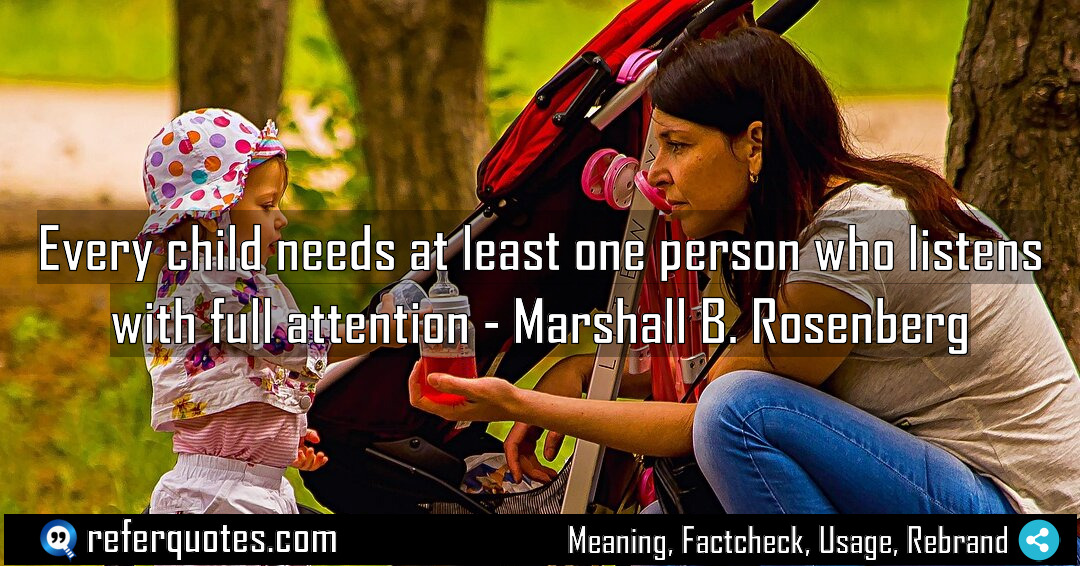
You know, that idea that every child needs at least one person… it’s so simple, yet it’s the absolute bedrock of development. It’s not about solving their problems, but about giving them the profound gift of feeling truly heard and valued. That’s what builds real self-worth from the inside out.
Share Image Quote:
Table of Contents
Meaning
At its core, this quote means that a child’s fundamental emotional survival depends on having a secure, empathetic connection with at least one caring adult.
Explanation
Let me break this down for you. “Full attention” is the key phrase here. It’s not just hearing their words while you’re scrolling on your phone. It’s about putting down the phone, getting down on their level, and listening with your whole being—your eyes, your body language, your heart. It’s creating a space where their feelings and experiences are the most important thing in the world for that moment. This isn’t a nice-to-have. It’s a need. It’s the soil in which their sense of self grows. When a child feels this level of connection, they internalize a powerful message: “I matter. My thoughts are valid. I am seen.” And from that place, everything else—resilience, empathy, confidence—becomes possible.
Quote Summary
Reading Level58
Aesthetic Score94
Origin & Factcheck
This comes straight from Marshall B. Rosenberg’s 2005 booklet, “Raising Children Compassionately.” It’s a core tenet of his Nonviolent Communication (NVC) framework. You sometimes see similar sentiments floating around, but this specific, powerful phrasing is unequivocally his.
Attribution Summary
Where is this quotation located?
| Quotation | Every child needs at least one person who listens with full attention |
| Book Details | Publication Year/Date: 2004; ISBN/Unique Identifier: 9781892005140; Last edition: PuddleDancer Press, 1st Edition, 48 pages. |
| Where is it? | Chapter: Listening Deeply, Approximate page from 2004 edition |
Context
Rosenberg wasn’t just talking about parenting techniques. He was placing this act of deep listening as the very first step in resolving conflicts and building trust without using rewards, punishments, or coercion. It’s the foundation upon which compassionate communication is built.
Usage Examples
So how does this look in the real world? It’s for anyone who influences a child’s life.
- For Parents: Instead of rushing to fix your toddler’s frustration over a broken crayon, you simply sit with them and say, “You’re really upset that your crayon broke, aren’t you? That was your favorite color.” You validate the feeling first.
- For Teachers & Coaches: A student says the work is stupid. Instead of a reprimand, you pull them aside and say, “It sounds like you’re feeling really frustrated with this assignment. Tell me what’s going on.” You listen to what’s behind the behavior.
- For Mentors & Family Members: That one aunt, uncle, or family friend who a kid knows they can go to with anything, no judgment. That’s the “at least one person” role, and it’s a powerful one.
To whom it appeals?
Share This Quote Image & Motivate
Motivation Score89
Popularity Score94
Shareability Score95
FAQ
Question: Does “full attention” mean I have to drop everything the second my child speaks?
Answer: Absolutely not. That’s a recipe for burnout. It means when you do listen, you’re fully present. It’s about quality, not 24/7 availability. You can even say, “What you’re saying is really important to me. I just need to finish this one thing, and then I can give you my full attention in five minutes.”
Question: What if I didn’t have this as a child?
Answer: This is a huge one. It’s never too late to learn this skill and offer it to others, including your inner child. It’s a practice. Start small. The act of giving this kind of attention can be healing for you, too.
Question: How is this different from permissive parenting?
Answer: A crucial distinction. Listening with full attention is about understanding feelings and needs, not necessarily agreeing to all requests. You can set a firm boundary (“I’m not going to buy that candy”) while still acknowledging the feeling with empathy (“I see you’re really disappointed we can’t get it”).
Similar Quotes
You know, I’ve seen it a hundred times. Children listen best when they feel respected—it’s a game-changer. It flips the whole script on traditional parenting and gets to the heart…
When we listen to children with our hearts, we’re tuning into a deeper frequency of communication. It’s about hearing the unspoken needs behind the tantrums and the silence, a skill…
You know, “Children who are heard grow up to be adults who listen.” It’s one of those simple ideas that completely reframes your entire approach to parenting and leadership. It’s…
Before asking a child to listen, ask yourself… it’s a game-changing perspective shift. This quote flips the script on traditional parenting, making the adult responsible for the connection first. It’s…
Our children become our teachers is a profound shift in perspective. It’s not about them lecturing us, but about the lessons they offer when we truly listen. This is the…
